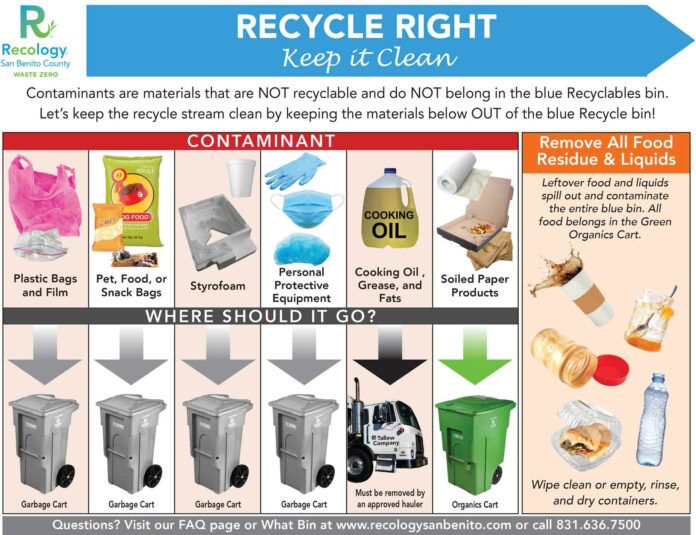Courtesy of San Benito County Integrated Waste Management:
Residents will soon see a new ‘Recycle Right’ program in San Benito County because of new recycling data.
This data, gathered by a third party, shows our recyclables have over 25% contamination. This means items that should be in the garbage were placed in the recycling bin. To address this problem, the San Benito County’s Integrated Waste Management Division (SBCIWM) and Recology are collaborating on this Recycle Right program to help residents and businesses learn more about what NOT to put in the recycling cart. Why is this important? Recycling contamination increases recycling processing costs, sends more tons to costly landfills and reduces the value of the materials that were sorted properly.
“What this new, local data shows us is that roughly 1 in 4 items placed in your home or business recycling container should actually be placed in your garbage or organics container,” explains Celina Stotler, Staff Analyst for SBCIWM. She clarifies: “It is important for our residents and businesses to keep recycling clean, meaning to keep foods, liquids, and contaminants out of the recycling stream.”
Let’s see how you do in this Recycle Right quiz. Does plastic film or plastic bags (like candy wrappers, chip bags, dry cleaner bags or sandwich bags) go in the garbage or recycling cart? (The garbage cart is the correct answer.) Does a pizza box go in the recycling cart, garbage cart or organics cart? (The organics cart is correct.) Where does a plastic-coated paper cup go (like the kind used for coffee ordered to go)? (The garbage cart is the correct answer.)
The “Recycle Right” campaign includes new social media informational posts, newspaper advertisements, and customer mailings to help residents put only acceptable materials into recycling carts and put other items in the trash or organics bin. Reducing contamination helps lower the recycling processing costs and “contamination rate” in the county—an important indicator of how successfully we are all recycling. To help residents understand better, Recology is using a cart-tagging system letting customers know that unacceptable items or “contaminants” were found in their cart or bin. “We understand that residents are home more during COVID-19 and want to do the right thing. This Recycle Right campaign is designed to help residents and businesses increase recycling and work toward zero waste,” explains Phillip Couchee, General Manager for Recology. “A World Without Waste” is our company motto, and we’re committed to that goal.” Find more information at www.recology.com/recology-san-benito-county/recycle-right/, review your Recycle Guide, and use the WhatBin search tool to learn what’s recyclable and how to sort properly.

Backgrounder: Recycle Right San Benito…Keep it Loose, Clean, and Dry
San Benito County Integrated Waste Management Regional Agency (SBCIWMRA) is a department under the Resource Management Agency that is responsible for administering recycling and waste reduction programs to meet CalRecycle waste mandates, protect public health and increase sustainability for its Regional Agency Members that include the Cities of Hollister and San Juan Bautista and unincorporated San Benito County. SBCIWMRA proudly coordinates comprehensive and cost-effective programs for residents, businesses, household hazardous waste, small quantity generators of hazardous waste, safe disposal for medication and sharps, motor oil recycling, Green Business Program, and more. These programs are necessary for the SBCIWMRA to reach waste diversion goals as outlined in the CalRecycle state mandates known as Assembly Bill AB341 (AB341) and Assembly Bill (AB 1826) as explained further below.
Recology San Benito County has a 10-year agreement with the SBCIWMRA to service residents and businesses with garbage, recycling and organics services. This agreement, managed by SBCIWMRA, began in 2018 and included new and enhanced programs to increase diversion of waste from the landfill. Recology first began serving the San Benito County area in 2008. Recology has over 45 operating companies in California, Oregon and Washington and is one of the 10 largest 100% employee owned companies. The Recology mission and vision to see a world without waste, represents a fundamental shift from traditional waste management to resource recovery and seeks to eliminate waste by developing and discovering sustainable resource recovery practices that can be implemented globally.
Department of Resources Recycling and Recovery (CalRecycle) has passed mandates known as Assembly Bill 341 (AB341) and Assembly Bill 1826 (AB1826) are two critical requirements that drive our efforts to reach waste reduction, recycling and reuse goals through various programs targeted for residents and businesses. AB341 was passed in 2012 and requires businesses that generate 4 or more cubic yards of total waste to implement a recycling program that diverts recyclable, reusable, and compostable materials away from the garbage stream. Mandatory Commercial Recycling (AB341) was one measure that came out of the California Global Warming Solutions Act (AB32) to reduce greenhouse gas emissions. The Mandatory Commercial Organics AB 1826 was adopted in 2014 and requires businesses that generate 4 cubic yards or more of total waste to implement an organics collection program for materials like food waste, green waste, and food soiled paper waste. In addition, multi-family dwellings with 5 or more units are also required to subscribe to a program to divert all green waste from the landfill. These recycling and organics collection programs are offered to residents and businesses under the Recology contract with the SBCIWMRA.







